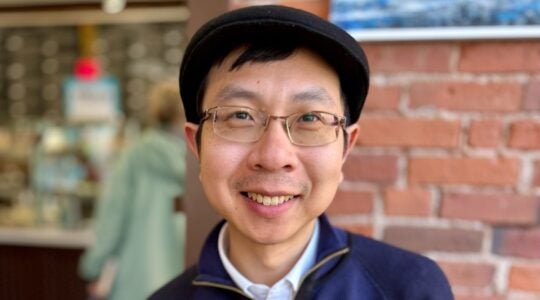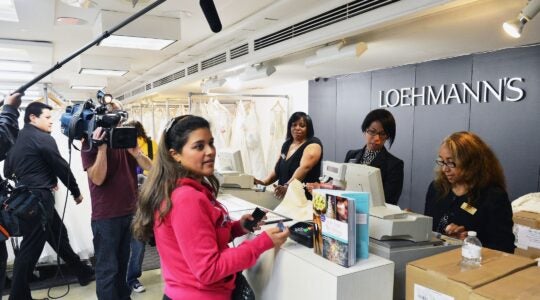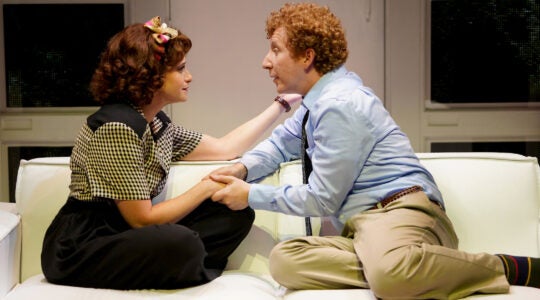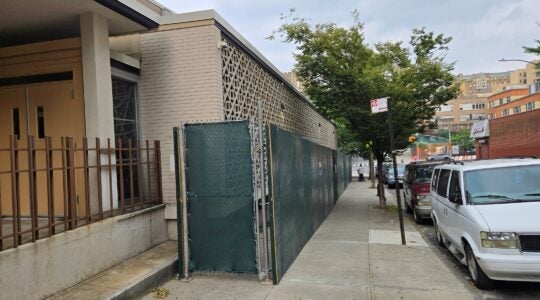I felt a pang of melancholy recently when I learned my friend Menachem Yankel Ejdelman was moving from his place at 101st and West End Avenue. It’s not like he’s being evicted or moving cross country (like many of the other friends I’ve met through Yiddishist circles).
The farthest he’ll probably go is Brooklyn. So why the sadness? Between 2007 and 2009 Menachem Yankel’s apartment was the site of a regular hangout for young Yiddish speakers, or a svive, where I was a regular participant. The svive was a project of Yugntruf, Youth for Yiddish, itself founded by Menachem Yankel’s grandfather, the eminent Yiddish scholar Dr. Mordkhe Schaechter.
For Yiddish speakers (and students), opportunities to speak the language have to be sought out and cultivated. The affirmative nature of being a Yiddishist leads to an instant bond with others like you and new friends around the world. It also means that a good part of our social network is virtual rather than local. But for a moment, a non-descript, Upper West Side multi-bachelor pad was an anchor dropped off our floating Yiddishland, a guarantee that at least once every month or so I would be speaking Yiddish with friends who could both correct my grammar and make me laugh. That they were some of my favorite people in the world certainly didn’t hurt.
The six-bedroom apartment on West End Avenue has been continuously occupied by a rolling cohort of single Jewish men since 1994, with Menachem Yankel in residence since 2007. The apartment (or at least its main public areas of kitchen, dining room and living room) was decorated in a style I’d call “second-hand bachelor apathy.” I can’t recall a single decoration aside from a large mirror over the fireplace. The best I could say about its furnishing was that it was eminently functional.
What the apartment lacked in charm it made up in two attributes: space and location, which, for the most part, are out of reach to the young and ambitious of New York City. With rent so absurdly high, it’s difficult for young people to live anywhere that might be considered “central.”
Members of the svive came in from the edges of the city still affordable to people like us: Washington Heights, Bushwick, Bed-Stuy, and points in between. The apartment on West End Avenue was not only central, but located right near a subway station. And with six bedrooms it was designed to accommodate anything from an intimate schmooze to a rocking khanike simkhe. At Sukkot an adjacent alley could be annexed for a party-size sukkah.
The svive Sukkot meals were probably the best I’ve ever had, company-wise, memorable for their unparalleled mix of every kind of Yiddishist, from anarchist to Satmar chasidim briefly on furlough from Williamsburg. It was at these meals that I most deeply felt the potential for common cultural ground to unite Jews. And when people ask why I persist with this so-called “dead language” I want to point to the svive Sukkot parties to explain why I can’t quit Yiddish.
When I walked in the door on a non-yom tov svive night, I was guaranteed a giant hug and kiss from Menachem Yankel and an exclamation of “Rokhl, lang nisht gezen, vos hert zakh” as if I were the tsenter, the 10th man in a minyan, the one upon whom everything depended. No matter that my Yiddish was often halting and overly dependent on a crummy Yiddish pocket dictionary; I was not just welcome, but important. The very survival of Yiddish was somehow more secure now that I was there to make a l’chaim and share some atrocious kosher pizza while catching up on the latest Yiddish world gossip.
Given the smallness of that world it wasn’t hard to find myself the subject of that gossip, in the nicest way, of course. In 2009 I started dating another member of our group. I was keeping it under wraps, or so I thought, until I knew how serious we would be. Soon thereafter was a svive night. I arrived with my new love and we walked in, totally cool, as we would any other night. Eventually I made my way over to a girlfriend to confide that I had started seeing someone. She already knew. Everyone knew. Menachem Yankel had caught us on the (unbeknownst to me) lobby security camera, making out while waiting to be buzzed in.
The svive wasn’t just about its (very close) group of regulars. Menachem Yankel’s invite list always included an impressive roster of Manhattan-based Yiddish-friendly folk (musicians, academics with real jobs, grad students in town for research) who drifted in and out when they had opportunity. The svive was also a destination for journalists and Yiddish thrill seekers from all over the world. It’s where I was interviewed by the BBC for the first (and I hope not last) time. It was even featured in a New York Times piece in 2009.
And now Menachem Yankel is leaving the apartment for a new phase of life. It’s not just him. The svive itself tapered off a while ago. Core members got married and got real jobs across the country, many using Yiddish professionally. Two members of the group have notably left New York City to start their own farm growing new Yiddish speakers. The balance has shifted, and it’s not all bad. It looks like soon we’ll have enough people in my neighborhood (Washington Heights) for our own svive. I hope Menachem Yankel will make the trip from wherever he ends up. ◆
Rokhl Kafrissen, who lives in New York City, writes about modern Yiddish culture.
The New York Jewish Week brings you the stories behind the headlines, keeping you connected to Jewish life in New York. Help sustain the reporting you trust by donating today.




